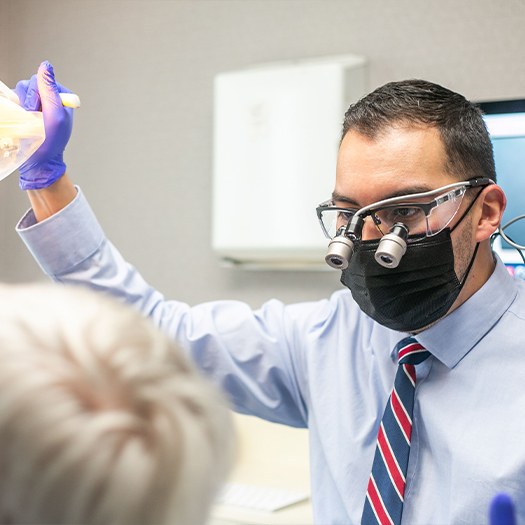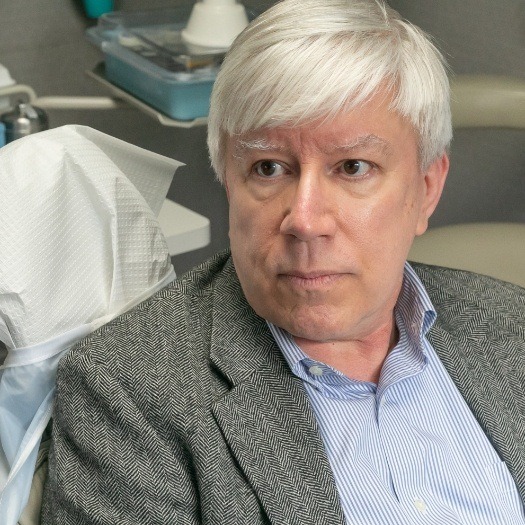Gum Disease Treatment Greenbelt
I am Concerned About Gum Disease

It's common to be concerned about your gums when they are bleeding, swollen, or tender. While large cavities and nerve infections hurt, periodontal disease is relatively painless, which is why gum disease is the leading cause of tooth loss in adults. Many people do not know they have gum disease because they are not in pain. The dentists and dental hygienists at McCarl Dental Group, PC have extensive experience and continued educational training in all aspects of gum disease treatment in Greenbelt. The services we provide are based on the patient’s unique requirements but are most frequently classified as gingivitis or periodontitis.
Why Choose McCarl Dental Group, PC for Gum Disease Treatment?
-
 Dedicated periodontal screenings
Dedicated periodontal screenings
-
 Eliminate infection at the source
Eliminate infection at the source
-
 Experienced, passionate team
Experienced, passionate team
What Is Periodontal Disease?

Periodontal disease is caused by bacteria that live in soft plaque, which is a sticky film that occurs naturally after you eat. If it is not removed within 48 hours through brushing and flossing, the plaque will harden into calculus, which is also known as tartar. If plaque and calculus build up and cause gum inflammation, it becomes what is known as gingivitis, its symptoms include bleeding and "puffy gums", which are reversible. Prolonged periods of inflammation, untreated bacteria, and subsequent dental pocketing can cause permanent damage to the supporting bone and is known as periodontitis. Its symptoms can include the breakdown of the connective structures that hold teeth in place, bone loss, infection in the gums, and loose teeth.
A person’s genetic composition often influences the severity of gum disease, how quickly calculus is accumulated, and how your body reacts to the presence of bacteria. While we can’t control our genetics, we can control the amount of bacteria by eating healthy foods, keeping up with daily oral home care, and attending professional cleanings with a dental hygienist twice a year. Once plaque hardens into calculus, it mineralizes to the tooth and can no longer be removed at home. The specialized tools used in a dental office are necessary to clean the bacterial deposits.
Maintaining Gum Health

The easiest way to ensure gums are healthy is to prevent oral health problems by brushing and flossing properly each day and visiting our dental office at least twice a year. Our goal is to help patients maintain their healthy smile, but if you do suffer from periodontal disease, we are here to help you stabilize your gum tissue and keep you educated on the latest treatment advancements.
Gum Disease Treatments

For patients suffering from mild gingivitis, more frequent professional teeth cleanings and improved home care may be enough to fully renew oral health. Patients with more severe periodontitis may need advanced periodontal therapies as well as more frequent teeth cleanings. These more advanced therapies include:
- Scaling and root planing – The systematic removal of plaque and calculus buildup at and below the gumline, including the roots of the teeth (during this procedure, patients are anesthetized so the treatment is pain-free!)
- Antibiotic therapy – Oral or topical antibiotics may be prescribed to reduce the levels of residual bacteria and prevent additional bone loss
- A referral to a periodontist, or gum specialist, if necessary
Common Risk Factors To Consider Include:

- Tobacco smoking or chewing
- Systemic diseases such as diabetes
- Some types of medication such as steroids, some types of anti-epilepsy drugs, cancer therapy drugs, some calcium channel blockers, and oral contraceptives
- Bridges that no longer fit properly
- Crooked teeth
- Fillings that have become defective
- Pregnancy
Several Warning Signs That Can Signal A Problem:

- Gums that bleed easily
- Red, swollen, tender gums
- Gums that have pulled away from the teeth
- Persistent bad breath or bad taste
- Permanent teeth that are loose or separating
- Any change in the way your teeth fit together when you bite
- Any change in the fit of partial dentures
Please don’t hesitate to contact us if you feel as though you may require gum disease treatment.
